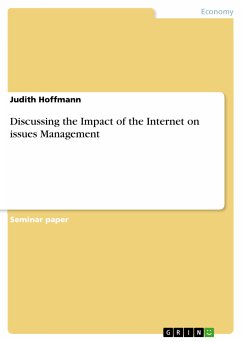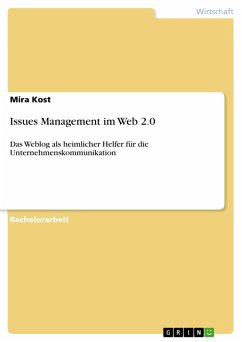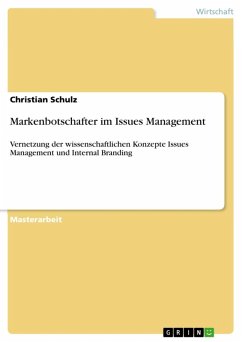Seminar paper from the year 2005 in the subject Business economics - Offline Marketing and Online Marketing, grade: 67, Bournemouth University (Media School), course: Public Relations, language: English, abstract: When Patrick Henry spoke those words more than two hundred years ago, the development of issues management was far away. Nevertheless his words describe what can be called the essence of issues management (IM) over the past 25 years. According to Jones and Chase (1979) issues management can be defined as a tool which helps companies to identify, analyse and manage emerging issues and allows for responding to them before they become public knowledge. Issues emerge, when a stakeholder has a problem with the company relationship, but a problem only turns into an issue when it moves from private to public concern (Coombs 2002). According to Niklas Luhmann (1996 [2000]) who states whatever we know about our society, we know through the mass media, IM used to be concerned with monitoring, influencing and reacting on media events, and thus changing company reputation in the eyes of the public (Moloney, 2000, Philipps, 2000). Accordingly media could be seen as a transmitter between stakeholder and organisation. Due to the gatekeeper function of journalists the louder voice of industry naturally has had more chance to be heard and get media coverage (MacLeod, 2000). This has led to a corporate communication which used to be a merely one-way activity in the times of traditional mass media (De Bussy, Watson, Pitt and Ewing, 2000). The internet has changed this situation. Not only that it allows for the first time real two-waycommunication (White, Raman, 1999), it has also added a new dimension to direct communication between organisations and their stakeholders (de Bussy et al, 2000). PR people as former gatekeepers of company's reputation are now bypassed (Philipps, 2000). People are communicating not only with the company if they have problems to address. They are communicating with each other. Recent PR books (Haig, 2000, Philipps, 2001, Middleberg, 2000) work already as a modern Cassandra, exhorting companies to be aware of the potent ial danger of the internet.
Dieser Download kann aus rechtlichen Gründen nur mit Rechnungsadresse in A, B, BG, CY, CZ, D, DK, EW, E, FIN, F, GR, HR, H, IRL, I, LT, L, LR, M, NL, PL, P, R, S, SLO, SK ausgeliefert werden.









